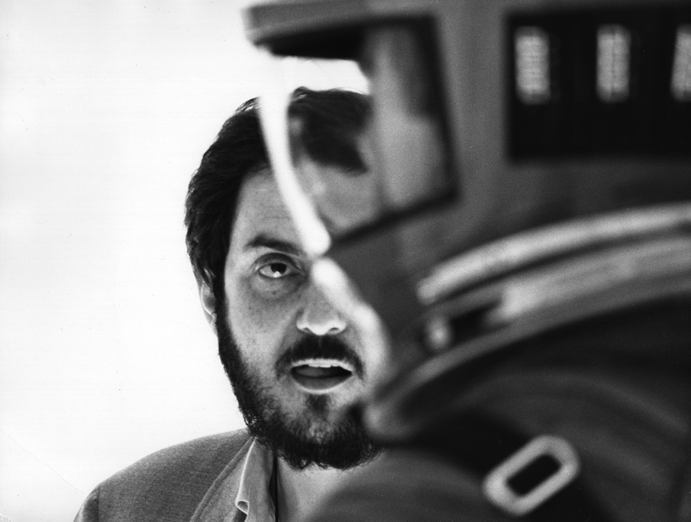Every year when his birthday rolls around — as it did this week — it’s another reason to look back at the endlessly fascinating filmography of Stanley Kubrick. Passing at the age of 70 with 13 completed features, one ponders at what additional films we might have received from the master director, but as a consolation today we have a list of the work that has most influenced him, or he simply enjoyed.
Curated over at Criterion.com (and recently shared by Open Culture), it includes 93 works culled from those close to him and various interviews in his life, including one in 1957 for Cahiers du cinéma, 1963 for Cinema magazine and an extensive BFI feature. Considering his specific admiration for certain titles can’t be measured, the most definitive is his 1963 list, which marked his only top 10 submission, featuring I Vitelloni, Wild Strawberries, Citizen Kane, The Treasure of the Sierra Madre, City Lights, Henry V, La notte, The Bank Dick, Roxie Hart and Hell’s Angels.
Throughout his life healso offered up some other superlatives, such as the work of certain directors (“Highest of all I would rate Max Ophuls, who for me possessed every possible quality,” followed up years later by, “The filmmaker I admire the most after Max Ophuls is without a doubt Ingmar Bergman, whose every film I’ve seen”) and specific films; Napoleon (“a masterpiece of cinematic invention”), Bob le flambeur (“The perfect crime film”), The Vanishing (“the most horrifying film I’ve ever seen,” he told Sluzier).
Also included is Krzysztof Kieślowski‘s The Decalogue, which marked the only foreword Kubrick ever wrote:
I am always reluctant to single out some particular feature of the work of a major filmmaker because it tends inevitably to simplify and reduce the work. But in this book of screenplays by Krzysztof Kieślowski and his co-author, Krzysztof Piesiewicz, it should not be out of place to observe that they have the very rare ability to dramatize their ideas rather than just talking about them. By making their points through the dramatic action of the story they gain the added power of allowing the audience to discover what’s really going on rather than being told. They do this with such dazzling skill, you never see the ideas coming and don’t realize until much later how profoundly they have reached your heart.
Check out the list below, which is in alphabetical order based on director, and for much more on Kubrick, dive into an archive related to his work here.
Annie Hall (Woody Allen, 1977)
Husbands and Wives (Woody Allen, 1992)
Manhattan (Woody Allen, 1979)
Radio Days (Woody Allen, 1987)
McCabe & Mrs. Miller (Robert Altman, 1971)
If… (Lindsay Anderson, 1968)
Boogie Nights (Paul Thomas Anderson, 1998)
La notte (Michelangelo Antonioni, 1961)
Harold and Maude (Hal Ashby, 1971)
Pelle the Conqueror (Bille August, 1987)
Babette’s Feast (Gabriel Axel, 1987)
Casque d’Or (Jacques Becker, 1952)
Édouard et Caroline (Jacques Becker, 1951)
Cries and Whispers (Ingmar Bergman, 1972)
Smiles of a Summer Night (Ingmar Bergman, 1955)
Wild Strawberries (Ingmar Bergman, 1972)
Deliverance (John Boorman, 1972)
Henry V (Kenneth Branagh, 1989)
Modern Romance (Albert Brooks, 1981)
Children of Paradise (Marcel Carné, 1945)
City Lights (Charles Chaplin, 1931)
The Bank Dick (Edward Cline, 1940)
Beauty and the Beast (Jean Cocteau, 1946)
Apocalypse Now (Francis Ford Coppola, 1979)
The Godfather (Francis Ford Coppola, 1972)
The Silence of the Lambs (Jonathan Demme, 1991)
Alexander Nevsky (Sergei Eisenstein, 1938)
The Spirit of the Beehive (Victor Erice, 1973)
La strada (Federico Fellini, 1954)
I vitelloni (Federico Fellini, 1953)
La Kermesse Héroïque (Jacques Feyder, 1935)
Tora! Tora! Tora! (Richard Fleischer, 1970)
The Fireman’s Ball (Miloš Forman, 1967)
One Flew Over the Cuckoo’s Nest (Milos Forman, 1975)
Cabaret (Bob Fosse, 1972)
The Exorcist (William Friedkin, 1973)
Get Carter (Mike Hodges, 1971)
The Terminal Man (Mike Hodges, 1974)
The Texas Chainsaw Massacre (Tobe Hooper, 1974)
Hell’s Angels (Howard Hughes, 1930)
The Treasure of Sierra Madre (John Huston, 1947)
Dekalog (Krzysztof Kieslowski, 1990)
Rashomon (Akira Kurosawa, 1950)
Seven Samurai (Akira Kurosawa, 1954)
Throne of Blood (Akira Kurosawa, 1957)
Metropolis (Fritz Lang, 1927)
An American Werewolf in London (John Landis, 1981)
Abigail’s Party (Mike Leigh, 1977)
La bonne année (Claude Lelouch, 1973)
Once Upon a Time in the West (Sergio Leone, 1968)
Very Nice, Very Nice (Arthur Lipsett, 1961)
American Graffiti (George Lucas, 1973)
Dog Day Afternoon (Sidney Lumet, 1975)
Eraserhead (David Lynch, 1976)
House of Games (David Mamet, 1987)
The Red Squirrel (Julio Medem, 1993)
Bob le flambeur (Jean-Pierre Melville, 1956)
Closely Watched Trains (Jiří Menzel, 1966)
Pacific 231 (Jean Mitry, 1949)
Roger & Me (Michael Moore, 1989)
Henry V (Laurence Olivier, 1944)
The Earrings of Madame de… (Max Ophuls, 1953)
Le plaisir (Max Ophuls, 1951)
La ronde (Max Ophuls, 1950)
Rosemary’s Baby (Roman Polanski, 1968)
The Battle of Algiers (Gillo Pontecorvo, 1966)
Heimat (Edgar Reitz, 1984)
Blood Wedding (Carlos Saura, 1981)
Cría Cuervos (Carlos Saura, 1975)
Peppermint Frappé (Carlos Saura, 1967)
Alien (Ridley Scott, 1977)
The Anderson Platoon (Pierre Schoendoerffer, 1967)
White Men Can’t Jump (Ron Shelton, 1992)
Miss Julie (Alf Sjöberg, 1951)
The Phantom Carriage (Victor Sjöström, 1921)
The Vanishing (George Sluizer, 1988)
Close Encounters of the Third Kind (Steven Spielberg, 1977)
E.T. the Extra-terrestrial (Steven Spielberg, 1982)
Mary Poppins (Robert Stevenson, 1964)
Platoon (Oliver Stone, 1986)
Pulp Fiction (Quentin Tarantino, 1994)
The Sacrifice (Andrei Tarkovsky, 1986)
Solaris (Andrei Tarkovsky, 1972)
The Emigrants (Jan Troell, 1970)
The Blue Angel (Josef von Sternberg, 1930)
Danton (Andrzej Wajda, 1984)
Girl Friends (Claudia Weill, 1978)
The Cars that Ate Paris (Peter Weir, 1974)
Picnic at Hanging Rock (Peter Weir, 1975)
Citizen Kane (Orson Welles, 1941)
Roxie Hart (William Wellman, 1942)
Ådalen 31 (Bo Widerberg, 1969)
The Siege of Manchester (Herbert Wise, 1965)
See more directors’ favorite films.
How many favorites do you share with Kubrick?

